
Christina Boreland
“Any discussion of avant-gardes today is immediately marked as belated, gesturing back to a period when the term named a viable desire to move beyond the limits of liberal capitalism.”
Evan Mauro
“When we are no longer children, we are already dead.”
Constantine Brancusi
“The semantic flux of notions like writer or artist is both the product and the condition of struggles aiming to impose the definition. In this way, it belongs to the very reality which it is concerned to interpret. To decide on paper and in more or less arbitrary fashion debates which are not decided in reality, such as the question of whether this or that pretender to the title of writer (etc.) belongs to the population of writers, is to forget that the field of cultural production is the site of struggles which, through the imposition of the dominant definition of the writer, aim to delimit the population of those who possess the right to participate in the struggle over the definition of the writer.”
Pierre Bourdieu
When I was in my early twenties, sometime in the early 70s, I was living in New York City. And a friend and I went out to Brooklyn, to a small church to hear a performance of some Christian Wolff compositions. I was fascinated with new music, and avant garde jazz {sic} and I remember it was cold that night and we stood around outside this small church with maybe twenty other people. At some point an old guy shuffled over to us, wearing a heavy overcoat. He looked like he might be homeless. He said to us ‘so you boys come out to hear the tunes’? I think I must have nodded and the old guy smiled. He was quite warm and his smile was really generous and open. Just then the doors opened and we hurried inside to get warm. After the concert a man came up to me and said, ‘do you know who that was, the man who asked you about the tunes’? I said no. He said that was John Cage.
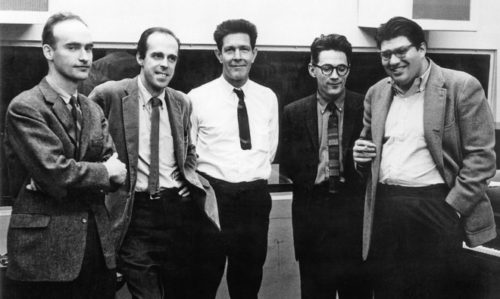
L to R : Christian Wolff, Earle Brown, John Cage, David Tudor, Morton Feldman. 1962.
I was thinking of Cage this week because a book of his letters has just been published. And thinking of him, and that odd meeting at the old church, made me think of NYC back in the 70s. I knew Anthony Braxton then, and visited Ornette’s apartment/penthouse on the West side, and I knew the theatre artists at Theatre Genesis, and Judson’s and La Mama, and I knew a few poets. Everyone seemed to know everyone in the arts back then. My old friend Terry Ork and I would go to at least one movie a day. Nobody seemed to actually work back then. But I don’t remember being broke, and I seemed to pay my rent easily enough. I worked part time on occasion washing dishes at a weird vegetarian restaurant on the lower east side. And I remember running into people on the street and especially at book stores. But back to Cage for a minute. What is Cage’s importance exactly? I doubt many people listen to his music now. I don’t very often, but I do. I do listen to Wolff on occasion, and to Eliot Carter and Milton Babbitt and Morton Feldman. And Boulez certainly, and a lot of Ornette and yet, I am no longer even remotely thinking of music. I was a terrible music student. I listen to Webern and Shoenberg, though. And Bartok. And yet, Cage somehow matters, I think. And this is sort of the question. In what way does he matter? And the short answer is that his sensibility matters. He connects to Black Mountain College and Merce Cunningham, and to Jasper Johns and Rauschenberg. I worked as a sort of secretary one summer in the mid 70s for Alwin Nikolais and Murray Louis’ dance company. I don’t think I lasted long at that job. But Cage connects to not just Cunningham, but to Bill Jones and Nikolais, and Pina Bausch even. Cage was one of those cultural forces. He knitted together the cultural energy of people who might otherwise have remained unintegrated. And this makes me wonder at the gradual and eventually not so gradual disintegration of the avant garde of the 20th century. Of modernism. But the fact that I feel a curious incoherence even writing this paragraph suggests something else. Modernism was, even at the end, even in the 70s, still linked to society — every name I’ve mentioned, in some fashion, was responding to the idea of a search. That was implied, always I think, in modernism.

Billy Al Bengston
I catalogued part of W.H. Auden’s library one summer. He died in 1973 and so it must have been right after that. I was working for an antiquarian book store just off Bleeker Street. They had only a fraction of his books, but most of what I catalogued, by hand and pre computer, were books of history. Ninety percent of the books were on ancient history. The rest on modern history. A few books of poems and an occasional book of philosophy. Such things seemed to happen in those days. An Auden library and chats with John Cage. Alan Ginsburg came into that book store. With Peter Orlovsky. I remember Greg Corso coming in, too. He was going on about Kubrick and 2001 A Space Odyssey. He didn’t like it. He was quite eccentric as I recall, but charming. These memories, though, seem distant now. Not to me, but as a social phenomenon, as part of the fabric of American culture. For there is no culture, today. There are artists, and very good art, whatever that means now. For whatever it means is something very different than it meant, as an idea, in 1975.
The loss of reading is very important in any such discussion. For books were totems. Book stores were odd sort of ritual locations. No franchises existed. All the stores I remember were independently owned. I worked at so many over the years. It was always easy to get a job at a book store. I guess not many people wanted to do what was seen, even then, as boring work. I had a job in Hollywood at the old Pickwick Book Store (later to become B.Dalton, managed by my Aunt, as it happens). And the man running the paperback section (it was a huge store and entailed three floors) was named Sidney. He was a wonderful man, overweight, and wore thick glasses. He knew every book ever published it seemed. I never found one he didn’t know about, or who published it. He didn’t care if we worked much. He let us all stand in the aisles, pretending to put books back on the shelves, but instead reading. I read a lot of entire books back then while standing. That store was a friendly place. We were paid shit, but that was OK. I was in my twenties and didn’t think about money. Such places are gone, too. The totemic properties of books is gone, too. Its not the same buying books online. I can’t afford to buy anything other than used books so I am forced to patronize Amazon. But then, they fill a need. New books are insanely expensive now. Most go to libraries if they are scholarly at all. Hence often a small volume of history will cost over a hundred dollars. Nobody reads so nobody cares.
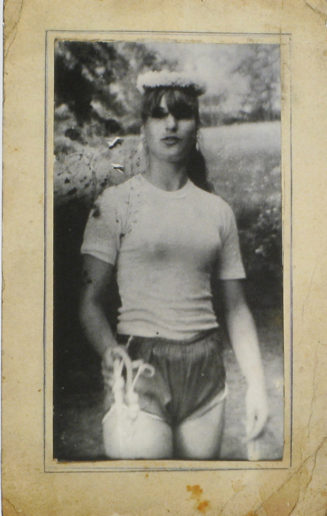
Miroslav Tichy, photography.
It is not just the information in books. It is their curious talismanic properties. I always had a book with me, usually in my shoulder bag. I’ve carried shoulder bags or satchels for forty some years. Always with books in them. I walk lop sided because of it. The significant loss, though, is of course in literacy. And literacy means a lot of different things. It means recognizing the historical precedents for political discourse. The narratives. Hillary Clinton is, in a sense, a sort of fictional character. The person is, and one gets this from *reading* the narrative version, ruthless and emotionally deformed by her ambition and anger. Trump I suspect has very little of the *real* about him. He is the kind of person who if you scratch away the surface tan and shine will find a deeper tan and shine. Mask after mask can be torn away to reveal ever cheaper and less well drawn masks.
“… avant-gardes have been defined by their ability to repeatedly generate new autonomous spaces of critique, however temporary and liminal.”
Evan Mauro
The critique of the demise of avant garde culture is one that underhandedly validates Capitalist principles by way of a soft criticism of same. For one thing, what is meant by demise, or more, by *failure*

John Cage
“capital’s value practices [are] in perpetual struggle with other value practices. [Capitalism] is also preservative of the rules generated by enclosures, because through repetition subjects tend to become normalized to them. Yet this is a normalisation that does not abolish conflict among value practices, but that turns this conflict into the driving engine of the evolution of the organisational form of capitalism while basic processes of homeostasis keep social forces and conflicting value practices coupled together.”
Massimo de Angelis
The above quote is a footenote in Mauro’s essay. This idea of value struggle is interesting, but first I want to look at a certain drift in theory, mostly French, and notably from Jacques Ranciere and Alain Badiou. Both suggest this notion of the early 20th century avant gardes as wanting to do away with the distinction between art and life (sic). Ranciere says that early 20th century avant garde movements were looking to create ‘new forms of life’. And while, firstly, being simplistic in the extreme, it is also simply not true. Putting aside the Futurists for a moment, which oddly many left theorists seem to prioritize, the thrust of cultural avant gardism was more to awaken potential for ridding bourgeois predominance in expression and the attendant political domination that came with that. The modernists repeatedly found new strategies, culturally, for avenues of liberation intellectually and emotionally (and spiritually) outside the ever more powerful system of enclosure that was Capitalism. What has changed over the last thirty five years, say, is that the so called death of modernism ushered in a significant new interlocking bureaucratic apparatus of curators, dealers, directors, academics, CEOs, agents, and career minded artists themselves to manage the manufacturing of image and narrative. Mauro, following on Hal Foster and others, points out that bureaucratic systems of management have actually absorbed the principles of early avant garde practices and strategies — or, more accurately — pretended to. The new management of digital and social media business systems manufacture the appearance of improvisation and non-hierarchical self management, but outside of adjusting away from the assembly line and 19th century factory model, have changed very little.

Carlo Zinelli
There was little actual conscious activity that looked to lessen the distance between art and life (not withstanding early Soviet constructivists, and I’d argue we have to examine the meaning of these words). And such crude grammar is itself a symptom of the problem. Define *life*. I mean art and culture have always searched for an awakening from ‘out of’ such simplistic models. From beneath the weight of compromised definitions and meanings. Art takes various forms, but it is never looking to somehow replace other aspects of existence. That is just a very primitive way of describing the history under discussion. This also leads to the other cliche that is often employed in post modern academia, and that is that somehow modernism was inherently elitist. It is a confusion over the idea of colonial political crimes, and the social ramifications, and the complexities of mimesis and immanence.
Capitalism itself, of course, in the age of marketing and Madison Avenue, is busy selling the idea of autonomy (as a branch of American individualism). And much of the new faux populism is the product of this basic reductive notion of autonomy — and the resultant self branding and commodification of the artist (Marina Abramovic is yet again the quintessential example). Now there is an interesting side bar note here. A small digression. When Mauro quotes Manfredo Tarfuri, and the critique of the mid century organizational plan, there can be seen in a handful of painters (at least) a resistance by way of incorporation. Tarfuri said organizational planning became the hegemonic cry from both right and left. The mid century solution (directed at the periphery). But in painters and artists like Agnes Martin and Kurt Schwitters, Louise Nevelson and even a Dan Flavin, you get the embrace of repetition and a kind of visual graphomania. Certainly in Roman Opalka and Zarina Hashmi.
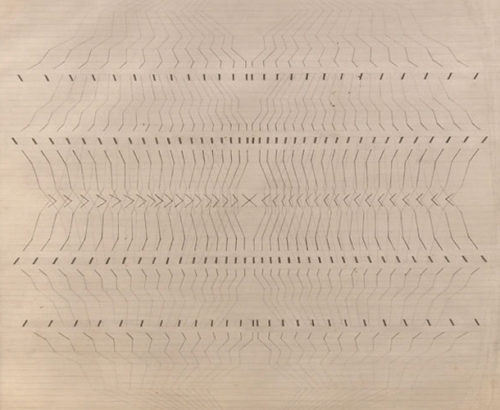
Nasareen Mohamedi
“But in saying that the grid condemns these artists not to originality but to
repetition, I am not suggesting a negative description of their work. I am trying
instead to focus on a pair of terms—originality and repetition—and to look at
their coupling unprejudicially; for within the instance we are examining, these
two terms seem bound together in a kind of aesthetic economy, interdependent
and mutually sustaining, although the one—originality—is the valorized term
and the other—repetition or copy or reduplication—is discredited.”
Rosalind Krauss
But putting that aside for a moment, Mauro (and Peter Burger, and Peter Wollen, and Matei Călinescu) see the death of modernism occurring mid century or maybe a bit later. And all of them see a kind of adjustment by Capitalism to commodify and where it couldn’t, to recuperate by dilution. I happen to think the harshness applied to Gropius and the Bauhaus is wrong, but the point is correct, finally. That corporate media rolled out the term avant garde upon the death of Lou Reed suggests the further implications at work. But even Mauro seems confused about the meaning of the politicizing of life by art. Again, define *life*? Adorno is the great corrective to this, of course, but the real point is that even when Soviet constructivists looked to blur life and art, what they meant was to make life creative and not oppressive. To solve the dilemma of alienation. And that is, finally, even beyond the political. But one cant get there from here, as it were. First the political must be addressed — and this, really, the entire point of culture. Otherwise you get a militaristic and authoritarian conformist state of proles and ruling elite. Kinda like the U.S. in 2016.
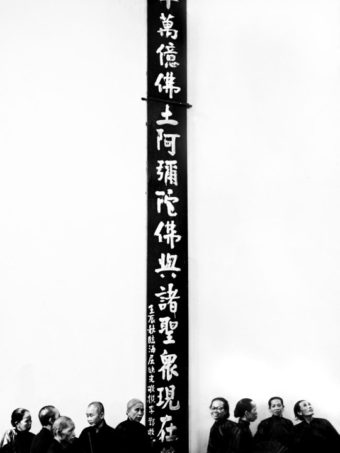
Fan Ho, photography.
Once culture waned, even as a thought, following the 60s (think Situationists) there was a commensurate increase in propaganda via marketing and advertising. The society of the spectacle went into hyper drive. No artist of any merit ever thought of making life into art (meaning, I guess, breathing and eating and not dying). Life is not art. Life, by any definition, is not culture. And if it were the very word *culture* would be redundant. Culture is collective for one thing but so completely has the North American Imperialist capitalist model eclipsed all discourse that these ideas of blurring life and art always, by default, mean individual ARTIST and not even audience, or collective enterprise or social attention. Culture is the place where social takes on both allegorical meaning, but also where people remember…individually but also collectively. Memory, if only individual, would be strangely animal like. Symbols themselves are collective, so are alphabets.
Frederic Jameson wrote that the 60s signaled the penetration of the final zones of pre-capitalism by capital. And then he mentions the unconscious. As if somehow the unconscious were no longer, well, unconscious. Just because western capitalism claims to have penetrated everywhere; including, I guess, our unconscious, does not quite make it so. But this is a crucial question, or rather its crucial to be more precise. Yes, the media has colonized our thought. But it has not really colonized it, not quite occupied it. It has created a mental state of obedience to command, but in fact, human minds don’t quite work that way. The resistance to aesthetic conformity and nullification can never really be complete. But it is also, as Jameson points out, the epoch when psychological restructuring took place on a massive level.
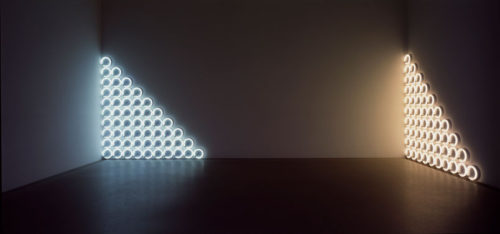
Dan Flavin
The idea was sold by marketers, certainly, that global capital was a fact and we had better get used to it. Even the final episode of Mad Men suggested this. Spiritual quests were for a commercial ideal. The commericial ideal commodity, rather than religious ideal. Matei Calinescu suggests that the term *avant-garde* itself, due in part to a somewhat unexpected commercial success for avant garde art after WW2, became a marketing term (and this is not restricted at all, even remotely, to the CIA or state dept short lived pushing of Ab Ex). And the earlier sense of crises and failure, which was and is always (even for antiquity in this sense) built into the creative process, is erased. Marketing emphasized maturity and responsibility, the idea of steady growth and the management of potential crises. Prediction. PLANNING.
“Poetry should be made not by one but by all.”
Lautreamont
Now, realism is making a comeback, if one believes mainstream media and its arts and culture sections (often now called entertainment section). And this, at least on a certain level, makes perfect sense. Realism is the new go-to stance for the faux populists. It is the most philistine and middle brow of the educated classes who LOVE that CIA story about american abstraction. Even leftist writers and sites are found quoting articles in the Independent (Zero Hedge for example). Other writers from across the spectrum seem to love the revival of Norman Rockwell. There is and has always been a sort of cultural terror on much of the left. (I refer you to my piece on these very pages titled Revisiting the New York School for a corrective). Anyway, the end result is a growth of hostility to art. Whew, now I don’t have to figure out how to talk about that Rothko. And all the while the radical immigrant and Jewish artists of the cold war, who fought for civil rights, protested, and rejected McCarthyism are denigrated as somehow tools of empire. And the result is an apologizing for the reactionary white kitsch numbed vision of a Rockwell. Who was an illustrator anyway, though such distinctions seem not to matter much these days.
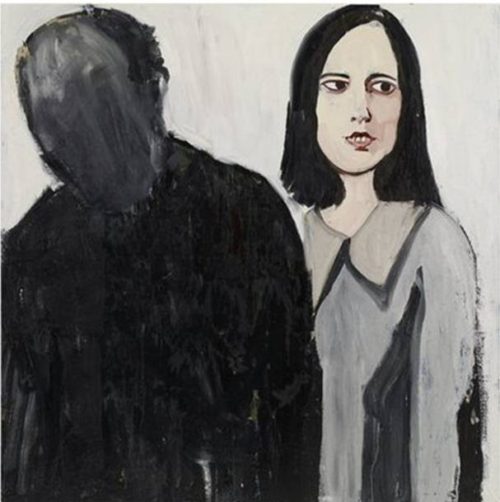
Chantel Joffe
But back to the topic at hand. Boris Groys writes…
“One can say that avant-garde and post-avant-garde art has finally achieved its goal—to become a part of “reality.” But this reality is not one with which we are confronted, or in the middle of which we live. Rather, it is a reality of which we are informed. In the contemporary world we are de facto confronted not with art but with information about art.”
Now, this is true, I think. And it relates to Adorno seeing one of the effects of the culture industry being the *reading* of images. This is the growing trend toward de-coding of the world.
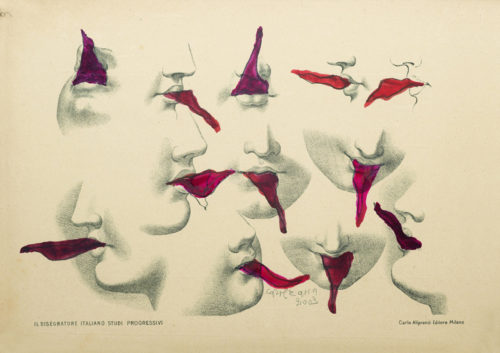
Carol Rama
“It is this positivist facticity of contemporary art that produces a nostalgia for realism. If art becomes a real practice—a legitimate part of reality—then discontent with reality turns into a discontent with art and all its institutions: the art market, exhibition practices, etc. And this discontent, this conflict with reality, calls for a new description: the New Realism. But why can such a description only be an artistic description? The answer to this question is obvious: discontent with the reality—insofar as it does not manifest itself through violent protest or revolutionary action—remains hidden, and is thus always under suspicion of being fictional. If I hate my job but nevertheless do it, there is no possibility to objectively prove my discontent with the reality of my existence. This discontent remains “fictional.” As such it can be described by literature and art, which have traditionally been regarded as domains of the fictional, but it cannot become a subject of serious scientific study.”
Boris Groys
Now, Groys goes on to suggest that the return of realism is the return of pyschologism. I think the problem is, again, that such language is already compromised in the historical arena of cultural production (per Bourdieu). Does realism mean the inner reality, or the visible outer reality, or neither, or both? I tend to see this return to a kind of illustrative realism as reactionary. It is part of a growing infantilism that sees complexity in interpretation as elitist. A new bourgeoisie that has lost the vocabulary to discuss culture in any depth or complexity. And this is why John Cage matters, I think. He was able to further a Duchamp-ian radicalized idea of artistic restructuring, as it were, but through a sensibility more social and charitable than Duchamp. Cage was prodigal but somehow human, somehow never profligate. At least as his persona went.
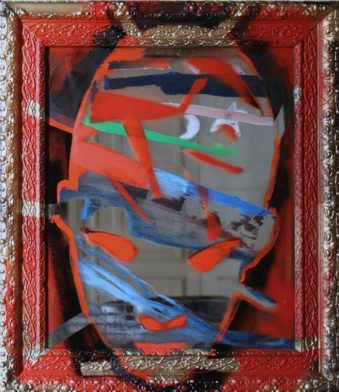
Giosetta Fioroni
Groys touches on this a little bit when he says…“It is very telling that contemporary post-Deleuzian, neo-Dionysian, accelerationist, and “realist” admirers of technological progress explain their admiration in exclusively psychological terms: as the ecstasy of a self-annihilation that produces extreme intensities in their psyche.” Now, is Francis Bacon a realist? Is Anselm Kiefer? I doubt many would answer yes to either. Is Mircea Suciu? It is perhaps in painters like Suciu or Serban Savu or even Victor Man that another kind of realism is returning. Suciu is among my favorite contemporary painters, and it is not unfair to call him a realist. Or any of the Cluj school of Romania. But it can also be seen as a return of psychologism, but this is my point. There is psychology and there is psychology.
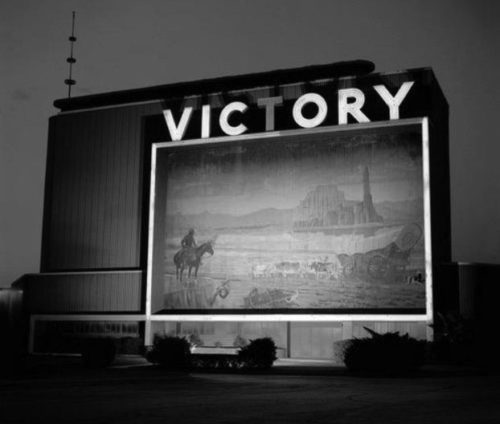
Photographer unknown. Victory Drive-In, southern Califoprnia.
Again define *life*. The entire discussion of *realism* is subsumed by larger issues of marketing and a propagandized collective narrative that stigmatizes the poor, and shames poverty. That recycles heroic myths of the military and police. The rise of far right parties across Europe is partly the result of a large percentage of young voters supporting a neo-Fascist anti immigration ideology and not just middle aged voters. One that often mixes in a fair amount of Nationalist rhetoric. The avant-garde of the early 20th century was already exhibiting the contradictions that escalated after WW2, and certainly after the 1960s. That as Jameson said….“aesthetic production [in the postmodern world] has become integrated into commodity production generally”. The fashion industry template. The selling of novelty. But all this was built into an Imperialist anti communism that sought control of more and more of the periphery. And the academic MFA arts business sells a certain vetted vocabulary (whenever I hear the word *body* in art criticism I recoil instinctively, as if all art isn’t on some level about the body). This specialized discourse achieves two things. One is creates academics as even more of a priest class with secret coded language. And two, it fragments the human into divisions. Into scientific categories that allow for easier research. Culture begins to resemble organizational planners from some local government agency. People are viewed as experimental prototype beings. And running beneath the entire mass cultural experience of the last fifty years is the constant erasing of class difference.
Now, one of the problems with Bourdieu’s analysis of culture is that it simplifies the ideas of working class aesthetics. The idea that those without economic capital must abandon the aesthetics of clothing and focus on purely material needs is a simplification (and distortion) of Marx. But it accounts for the lingering hostility to art and culture among many on the left. Its too precious or mamby pamby to discuss art. American history suggests no greater creative group than black Americans, for example. From music to art to even fashion, the underclass, even from prison, revolutionize daily life aesthetically. This is an expression of resistance. Aesthetic resistance.

Ştefan Câlţia
David Gartman, on Bourdieu….
“Bourdieu states that the cultural field in modern societies is divided into
two subfi elds. One is the subfi eld of large-scale or mass production, in which
producers are driven by the practical interests of making money by satisfying
the needs of the largest market. This subfield generally draws producers
from the middle and lower classes, whose habitus privilege practical function
over form. The other subfi eld is that of restricted or small-scale production,
in which producers are driven not to make money but to receive
recognition (cultural capital) from other producers. This subfield generally
draws producers from the high bourgeoisie, whose habitus privilege form
over function. So cultural producers in each subfi eld are motivated by both
external habitus and internal competition to produce cultural goods that
meet the needs of the diff erent classes. In doing so, they also legitimate the
overall system of economic inequality by elevating the tastes of the dominant
class over those of the dominated class.”
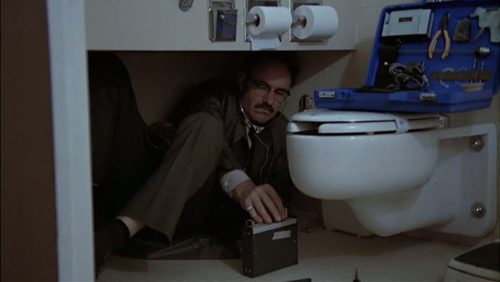
The Conversation (Francis Coppola, dr.) 1974.
This sounds fine, and mostly is fine, sort of. The problem is, though, that art and culture operate with more complexity than this suggests. Bourdieu gradually altered some of this toward the end of his life. He became much more critical of mass culture and its effects. And he saw the ways in which this new mass culture, the post avant-garde culture of the west, had manufactured an illusory model of equality that masked class conflict and even neutralized it. So, the question becomes in what ways can cultural production escape this illusory model of the world. A model that sustains most of what passes for *realism*. This mass cultural apparatus is cunningly selective in what it chooses to emphasize. The valorizing of science and rational planning is applauded without ever really providing much in the way of actual information. I think this quote from Loic Wacquant suggests some of this selectivity…
“The reach of penal authorities has also been dramatically enlarged beyond probation and parole by the exponential growth in the size, scope, and uses of criminal justice databases that, as of 2000, contained roughly sixty million files on an estimated thirty-five million individuals. Novel panoptic measures include the diffusion of official “rap sheets” through the Internet, the routinization of “background checks” by employers and realtors, the spread of public notifcation statutes (and related laws seeking to expurgate specific categories of convicts, such as sex offenders, from the social body), and the shift from old-style fingerprints and mug shots to DNA prints coordinated by the FBI.”
The mass cultural narrative, the one regarded as resurgent and as realistic is in fact wildly redacted. If anyone can find me a Hollywood product that criticizes the practice of background checks and surveillance I’d love to see it. And yet, this was not true a mere forty years ago. The post Vietnam cinema of Hollywood was expressing a huge sense of paranoia and suspicion, as well, of course, as it expressed a sense of masculine crisis. Coppola’s The Conversation was a film that would be hard to imagine today. A few years earlier, Antonioni made Blow Up, a film that also dealt with what might or might be there. That questioned the idea of what ‘really’ happened. Patricia Highsmith, especially in a novel like The Tremor of Forgery, is writing the very same story. And that story is the dissection of the everyday, of what passes for ordinary life. Interestingly Graham Greene called this Highsmith’s finest work. A wildly overlooked masterpiece. And it is precisely the quality that comes from a Tunisian locale, coupled to the primal crime, or death anyway, of a film producer. Its a very *meta* novel. The narrative, though, is not unlike both Blow-Up and The Conversation. The lone isolated masculine, lacking in potency and anxiety ridden. And finally, paranoid about a crime. And realizing at some point that the crime isn’t really the topic. But I digress. The loss of an avant garde has meant a shift toward an overwhelming consensus, both on right and left, that art is….fill in the blank. Whatever is filled in, the message is that culture is lacking as a meaningful consideration.
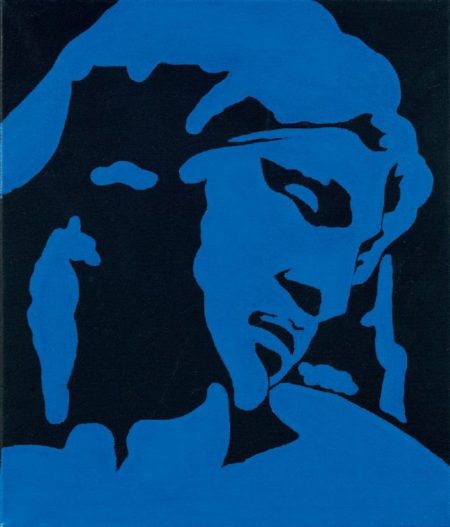
Tano Festo
Mass culture today is constantly rebooting itself, finding new style codes, new appropriations but always in the service of exclusion. In a sense, one of the central difficulties in aesthetic discrimination, and in aesthetic experience at all, is that the machinery of cultural production offers a variety of aesthetic crimes from which to choose. There is no monolithic *mass culture*. There is a system of constant and varied productions, all of which however, function as delivery systems for a certain class obfuscation. Comic book super heros or Lena Dunham or HBO fantasies — or the puerile MFA novel, all of it is quite different, and yet all of it takes up cultural shelf space. And worse, all of it normalizes a certain infantile aesthetic. All of it, and it is no small point that there is so much of it, is increasingly intentionally disposable. There is very little work coming out of Hollywood that is meant to be remembered. Nobody thinks whatever is praised today will be around in sixty or eighty years. And the tacit message is that long term thinking itself is obsolete.
“The masses want the shameful difference separating art from their lives eliminated, because if art were to have any real effect on them it would be that of instilling a sense of loathing, which is the last thing they want”
Adorno
One cannot create a formula or theorem that includes *life*. Life is too vague a term. But one does know, or sense, if only by a process of elimination, all the things not meant by that word. And everyone knows on some level that the experience of pleasure (another loaded word) in artworks, whether brief and superficial, or haunting and transformative in some way, is in opposition to the whatever it is they wake to every morning. The unbearable disenchanted spectacle of this neo liberal militarized plantation system that is damaging both psychically and physically. One can read a Dostoyevsky and not feel that sense of waste and loss that most Hollywood product provides. This is something that has changed, though, since the mid 20th century. The mass cultural product, from Hollywood anyway, is publicly embraced, but privately is often a source of anxiety, if not despair. Mass product today both sells fear and sells security simultaneously. It sells shame and pride simultaneously. It sells optimism and pessimism, and cynicism, simultaneously. This is managed psychic equilibrium.
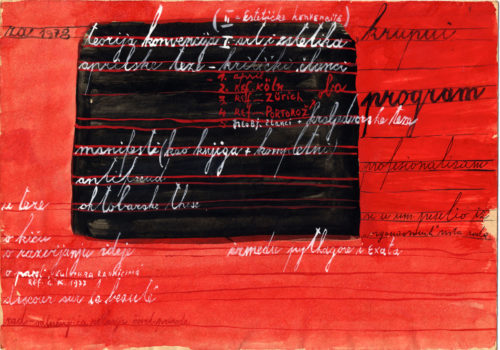
Mangelos
“The alienated consumers of the administered society want what is forced upon them by their corporate masters, because their needs are just as much products of the technological apparatus as the goods they consume. As workers, they have been standardized and homogenized by the same production process that levels and standardizes cultural goods. “
David Gartman
The political spectacle of this current election is very much a cultural product. Manipulation is accepted by the public as a given. It is part of the pleasure of watching this pseudo sporting event. The superficial reading is encouraged by mass media. The kind of voice that might break through this patina of well conditioned narrative fiction is removed. The corporate owned system of image and sound is there to provide ‘the same’ thing, over and over and over. The working class and the poor, both, in contemporary society, seek a false unification with a certain kind of entertainment, but also, more, with what is sold to them as the luxury of leisure time activities. It is the white underclass in particular that embraces certain leisure tropes of an acute uniformity with startling unanimity. This is gendered, too, of course. The white male is provided with the machinery of *fun*, from dirt bikes to various other outdoor recreations, all of which mimic an obsolete factory skill set. A lost memory trace of working with your hands, even if oppressively repetitive. All of these factors are seen in the strange spectacle of male outdoors recreation. For the urban dweller these items are transferred to either a virtual field, or more likely to organized sports of some sort. And to official spectator sports. Fantasy leagues and semi legal betting of major sports are officially sanctioned entertainments. And in all cases they are fitted with codes for freedom and U.S. exceptionalism.
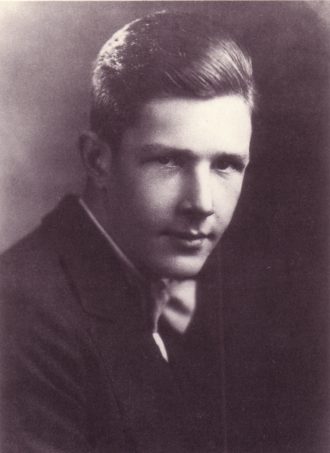
John Cage, high school portrait.
John Cage feels very far back in the cultural rear view mirror today. And the death of literacy as something of value, is resulting in a narrowing of the psychic field. The haute bourgeoisie no longer see the societal field the same. It is an economic market, today. One to be organized for, planned for, and managed. Woody Guthrie loved Cage’s prepared piano pieces. I think Etudes Australes remains rather significant. You can hear Satie in it, and you can hear the influence on everyone from Paul Bley to Cecil Taylor. Cage’s sensibility was based and built on a genuine rigour. He did compose, and his music still matters. His art was not a stunt. He is a homeboy, too, born in Los Angeles (his father was an inventor who created a diesel fueled submarine). His mom worked for the L.A. Times on occasion. Personally, I’m glad I met him, even if briefly.
“If something is boring after two minutes, try it for four. If still boring, then eight. Then sixteen. Then thirty-two. Eventually one discovers that it is not boring at all.”
John Cage

Cage was an absolute genius for sure. Not sure if it was just for the purposes of hte essay but if you want somewhere better than amazon for used books AbeBooks is a great place to get used books of all sorts for very cheap as to send your own books to that you might not want or need anymore.
As an aside, I saw that you expressed a bit of indignation at the relatively low number of comments on your pieces in general compared to when you mentioned the Nobel prize. Can’t say that it’s definitely a factor but the comment box here has a timed expiration related to the capcha that deletes everything in the box when you refresh the capcha, or at least it used to work like that, On at least a few occasions I spent close to an hour writing a comment only to forget this and lose the whole thing as a result, and then neglected to retype it all out of frustration.
yeah, sorry Garl. Ive been trying to get that capcha thing fixed.
THIS comment from Rita V. (who timed out too):
_________________________________________
I like this post, and too many openings for discussion to just pick one, but I guess I will.
“Art takes various forms, but it is never looking to somehow replace other aspects of existence.” And the trinity of progress, marketing and technology has that as its main mission. Ignorance has replaced intelligence, learning, logic and literacy as a positive value…just discussing this with my husband this morning, he commented, yeah, the masses have become a “tabula rasa”…on which can be inscribed literally anything; anything except the truth, which is now relegated to “the elites” who are “not to be trusted”. I am always suspicious of nostalgia but I persist in the regret that my daughter is pressed into particular choices by the hegemony of late capitalism that has erased the kind of carefree way of life young people were able to experience in the 70s. Kids are forced to adopt an ambition, whereas when I was young ambition took a long second place to adventure and experience, unhinged from career.
Thanks John. I had a friend who worked at the Strand bookstore in NYC in the early nineties that introduced me to John Cage’s writing- Silence and A year from Monday were revelations. Sort of a Zen Duchamp, I can’t think of anyone else quite like him. I can’t imagine running into someone that’s read that stuff nowadays. Thanks for your always great entries.
Good think piece. Well, they all are. I saw Cage in the ’70s and he wasn’t what I expected. Still, and though I didn’t have a clue what was going on, I remember thinking two things: 1) This is real, and 2) This is over. There is nowhere to go and no going back, and this moment will fade, has faded. And that is all. It was like those extreme philosopher physicists who believe the universe was created in the nano fraction of a second when God had a conscious thought, or a moment of self awareness rather, and then having had it, moved on … leaving the rest of us wandering around the magnificient ruins muttering “what do we do now?”
Thanks as always for your essays (and the book) on aesthetic and other matters. Although I rarely comment, I do read them all. I teach a course on Cage and experimental music at a small liberal arts college, and I have found my students to be surprisingly receptive to his music and philosophy over the years. The mainstream music establishment seems to have forgotten him, but Cage’s influence is still felt in the current experimental jazz scene. I have put on a number of workshops with experimental/avant-garde musicians from Chicago who have a great reverence for both Cage and Ornette. Today I think especially of Cage’s student essay on America, in which he wishes that the USA would learn to see itself as it is viewed from outside, to realize that “other people think”, and to finally accept that we are “just another country.”
I’m not sure that this will post, as I have violated that time limit others have mentioned.
thanks Jerome and Kevin both. Very interesting to hear. And sort of heartening.
Just an aside- enjoyed your piece over at counterpunch. Not sure why you don’t post that stuff here- you must have your reasons. Anyways glad to see your writing on the political scene- balanced comprehensive voices are few and far between in the sea of noise. Spot on, thanks.(Did CP get rid of their comment section? Whatever, I wouldn’t want to post a comment there anyhow. Also looks like the timeout thingy is fixed when you refresh text still there)
This post brought up a lot of memories for me. Forgive me but I’m mostly type this for my own benefit since these deep seated memories bubbled up thanks to your essay.
I was in office of a well-regarded English prof at my well regarded college. We were having a pleasant wide ranging conversation and then I brought up some books I had read back in high school. She challenged me at first and said that “nobody” read those books anymore. I forget if this was before or after I embarrassed her in class by pointing out that she was completely off base on a reference in a Borges story. Anyway, my great aunt was hoarder and she had a lot of junk in her house but she also had a huge collection of books dating back to the late 19th and early 20th century. When I discovered them I started reading them I guess because they were visually intriguing and completely unlike anything I saw in school or at my family’s house.
I remember short story writer Carol Bly saying in an interview that when she was in high school she couldn’t wait to be an adult because she thought the adult world was constantly having fascinating conversations instead of the nadder-nadder in high school. Carol ended that bit with “And then I went to my first Kiwanis meeting…”
I worked for several years in non profit arts organizations as an administrator and fundraiser. I’m very glad for the experience but some things that stick in my mind is how I was labeled a “non-artist” at this well regarded ballet company. I could get into interesting conversations with the artistic staff and dancers and as soon as I expressed something they didn’t agree with — oh, well you don’t live Art…. You just don’t understand. This org was run by a megalomaniac Southern woman who thought that if she didn’t know something it didn’t exist. She would constantly correct me on things I knew I was right about and dismissed my ideas because I was not a professional artist.
Another organization I worked for I had to manage three 20-somethings who were completely against me from day one. I am convinced that the reason is that one of these people “researched” me on social media and discovered a post where I made fun of Game of Thrones. She took any chance to dress up as whatever character from the series, went to ComiCons and would talk about it all the time like it was the most brilliant thing. These kids all had the same mindset and style codes and they just couldn’t take other viewpoints and dismissed anything I said.
I’ve been working independently since 2011 and never looking back to organizations.
The majority of kids in the world, and certainly in the US working class, have always had to adopt an ambition, and usually an ambition of survival.